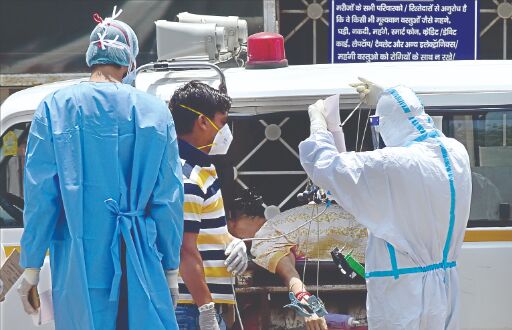No Twitter for SOS, urban poor run helter-skelter, scared of vaccination

New Delhi: Migrant workers who did not go back to their villages before the lockdown and depend on working as household help, car washing, shop assistants, and other sundry jobs, are stuck in the city without access to medicines or any other healthcare facility. Unlike much of the middle and upper class urban population who is able to share and access resources through social media platforms such as Twitter, they have to rely on word of mouth and the generosity of their employers for even the most basic healthcare needs. Apart from that, fear of losing their livelihood and vaccine hesitancy due to apprehensions about sterility or losing their fertility or just being ineffective, add to the confusion and misinformation.
Omvati (48) lives in a JJ cluster and earns her living working as a housemaid in West Delhi's Kirti Nagar locality. Few weeks earlier, the Delhi Government set up vaccination booths in her area, rounding up all eligible (those above 45 years of age) residents for their shots. Omvati got vaccinated as did many of her neighbours but she does not know which vaccine she was given.
In the past month, several people in her colony died of "ajeeb sa bukhar (strange type of fever", Omvati said.
"Doctors and ambulances refuse to come to our house and if we manage to take any patient to the government hospital, there is never any bed or doctor or medicine available. Now we have to hide any sign of illness because if my employers find out that anyone from my area has corona, they will not allow me to work. I have 4 daughters, how will I feed them?" she asked.
Reena (39) works in a RWA colony in Mayur Vihar and lives in a small slum settlement closeby with her husband and 15-year old son. Most others there left for UP when the lockdown was announced. From a village near Unnao in UP, Reena said that everyone in her community (including herself) is hesitant about getting the vaccine and even going to consult a doctor or buy medicines because they fear being exiled.
"Two people in my area died after taking the vaccine so I am scared to take it," she said.
Deepak (28), who lives on the ground floor of the same building as Reena's, with four other men from his village. He said he could arrange for medicines for a friend only after making calls to a doctor he worked for.
"If neighbours come to know, they treat us as outcasts. Once I was not able to sleep and went to wash cars with red eyes, so the home owners called the guards and banned me from entering the colony for 14 days. I tried explaining but they did not listen and I was not able to earn anything", said Deepak, who also runs a small ironing kiosk which has not seen much work.



